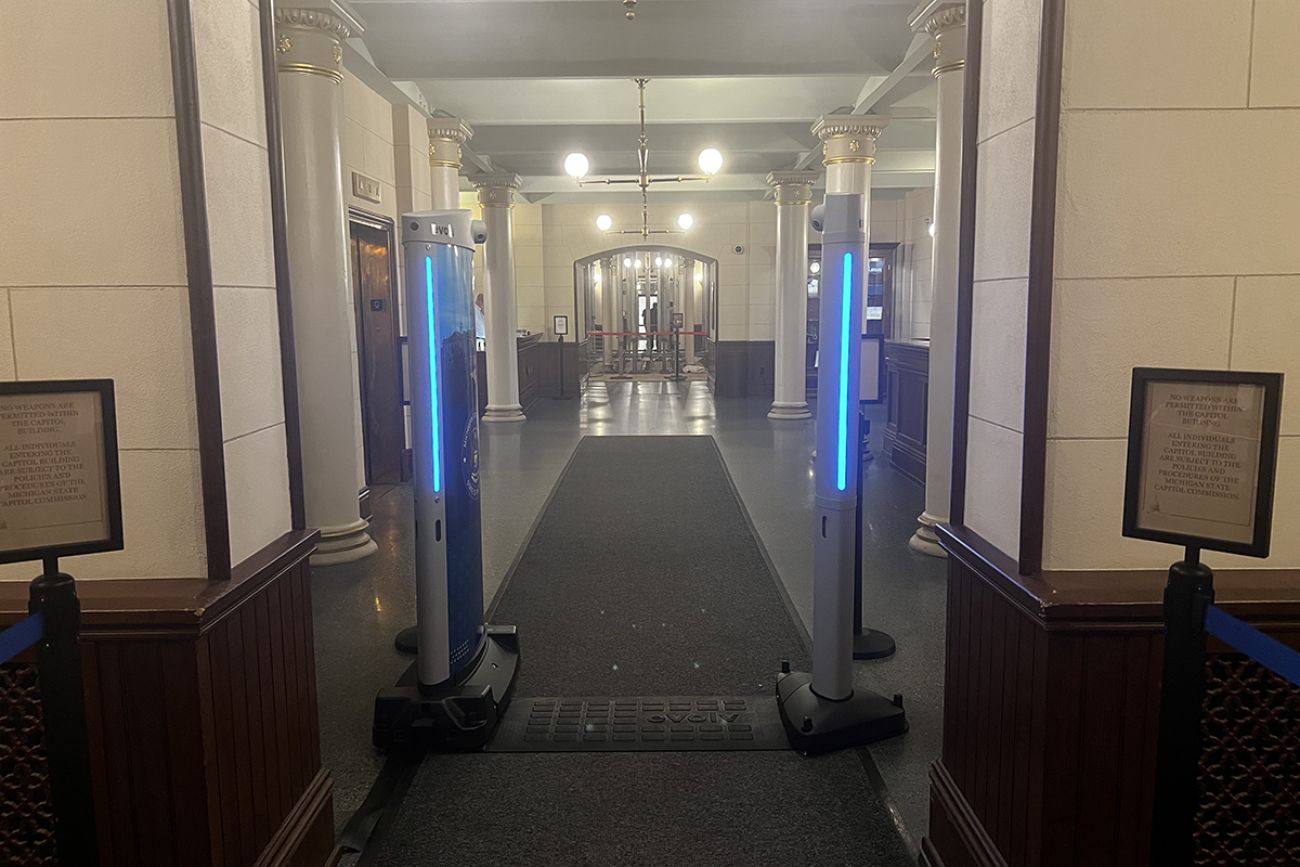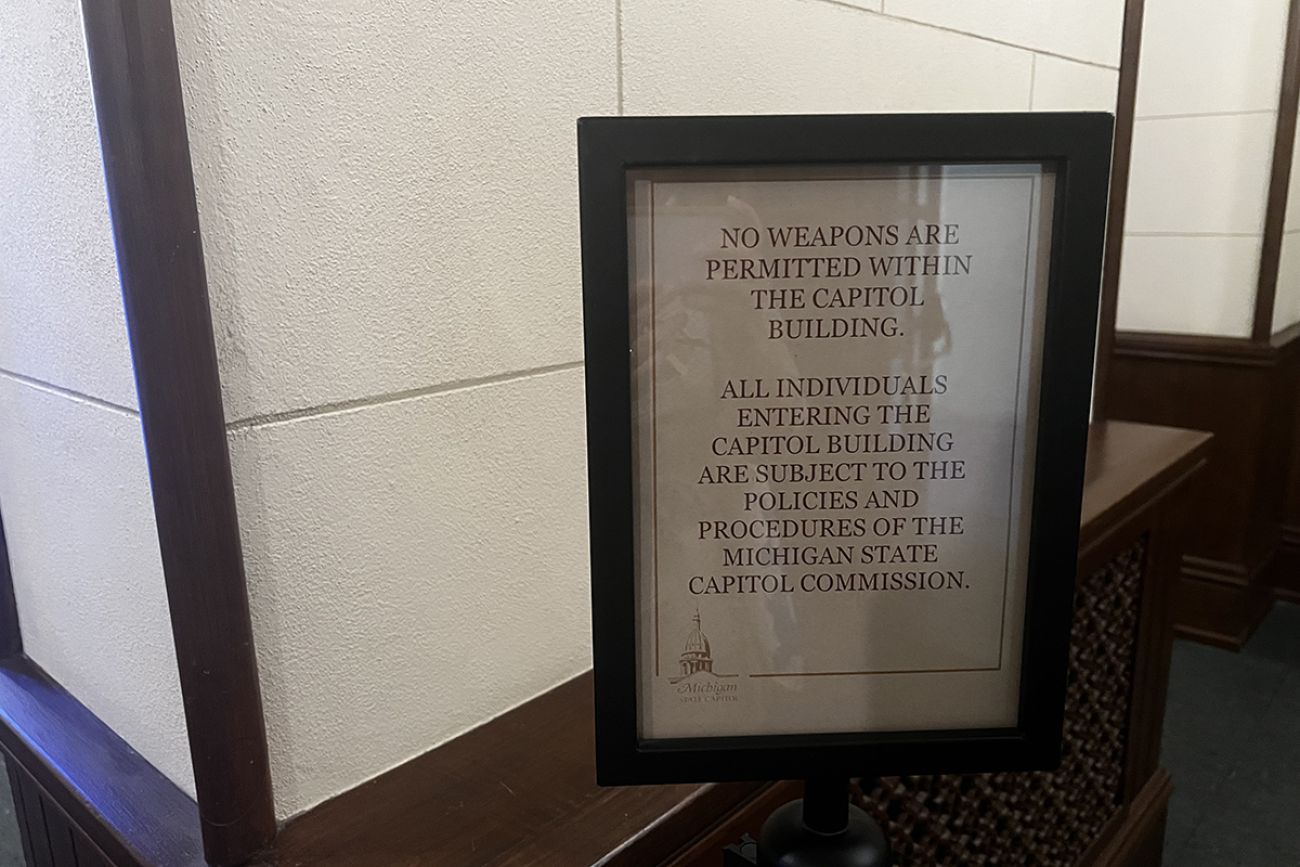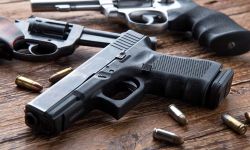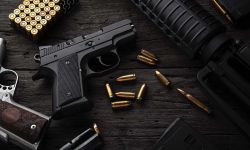Michigan Capitol Commission bans guns, but exempts lawmakers from rule

- Michigan State Capitol Commission bans most visitors from carrying concealed guns inside the Capitol
- The rules exempt state lawmakers, following concerns from some who wish to keep carrying guns to work
- Lawmakers may introduce legislation to write the policy into state law, one commissioner says
LANSING — The Michigan State Capitol Commission voted unanimously on Wednesday to ban concealed carry on state Capitol grounds, joining 24 other states in barring most Capitol visitors from carrying a gun.
But commissioners also voted 4-2 to exempt serving state lawmakers from the sweeping ban as long as they have a concealed carry permit, after some lawmakers pushed for the carveout.
Commissioner Tim Bowlin, director of the Senate Business Office, told reporters the exemption was a “compromise” to receive “buy-in” from legislators while also improving the security of the Capitol building.
“Would I like to see the entire Capitol and the grounds … gun-free? I would,” he said. “This is all about taking steps … to make this building safer.”
Related:
- Michigan Democrats eye stricter gun restrictions for domestic abusers
- As school returns, Flint and Grand Rapids rethink their backpack bans
- Whitmer signs ‘red flag’ law, allowing Michigan judges to confiscate guns
The commission has spent months finessing a ban on concealed carry inside the Capitol building.
Commissioners had banned openly carrying firearms in the Capitol in 2021. That ban followed a surreal episode in late April 2020 when militia members openly carried rifles inside legislative chambers and terrorized lawmakers during a protest against COVID-19 rules. Earlier this year, Democrats also passed a series of laws to tighten firearm restrictions, including universal background checks, safe gun storage requirements and a “red flag” law that allows a judge to order someone’s firearms be taken away if the person is deemed a danger to themselves or others.
“It’s too bad in the current climate that we have to do this, but I’m very pleased,” commission Vice Chair Joan Bauer said of the new gun rules on Wednesday. “I think it’s a step in the right direction in terms of making this wonderful historic building … safer.”
There are already walk-through metal detectors at all Capitol entrances. Capitol security guards examined a Bridge Michigan reporter’s bag after the machine detected her laptop before allowing her to enter.
A sign that stood at one of the entrances said: “No weapons are permitted within the Capitol Building. All individuals entering the Capitol Building are subject to the policies and procedures of the Michigan State Capitol Commission.”

The procedure approved Wednesday will take effect three days after the executive director of the commission delivers written notice to the governor and the majority and minority leaders of both legislative chambers that the system is up and running, according to the rules.
Under the new procedure, firearms, explosives and other weapons Capitol security identify as threats are not allowed in the Capitol building. Those who come into the building will be subject to screening by the security staff.
Only security staff, active law enforcement officers, active federal enforcement agents, private security details and serving state lawmakers with a concealed carry permit are allowed to carry concealed weapons inside the building. Under the procedure, future lawmakers would also be exempt once they are sworn in, commission chair William Kandler told reporters.
The exemption of lawmakers came after several lawmakers, both Democrats and Republicans, expressed a desire to keep carrying guns into the Capitol, Bowlin said Wednesday.
“Were we doing anything to impede the member from … being able to vote? That was a question that was brought to my attention,” Bowlin, who voted for the carveout, told reporters.
“Making this carveout for legislators allowed us to move forward,” he added.
Bauer and Kandler, the commission’s vice chair and chair, were the only two members voting against an exemption of legislators. Kandler said the exception was not necessary and allows “potentially up to an additional 150 guns in the Capitol building.”
“The legislators are probably the most protected people in the city, maybe in the state,” he said, arguing they are protected in the building by Senate and House sergeants-at-arms as well as the Michigan State Police.
Despite the exemptions, some Republicans criticized the decision.
Sen. Michele Hoitenga, R-Manton, argued Wednesday the decision forced “law-abiding citizens” to “give up their rights.”
“The money that the Capitol Commission is spending to prevent Michigan residents from protecting themselves in the Capitol would be better used improving student safety at our schools,” she said in a statement.
Rep. Phil Green, R-Millington, criticized the commission’s decision-making process in an interview with Bridge on Tuesday. He argued that an unelected commission should not hold the authority to ban guns on Capitol grounds, and the authority should instead be the Legislature’s.
Green also argued that federal law allows retired former law enforcement officers to continue carrying concealed weapons as long as they meet certain qualifications. The commission policy to ban that, he argued, would violate federal law.
“I'm trying to get the Capitol commission to recognize the law,” he told Bridge.
The federal law Green referred to does authorize some former law enforcement officials to carry concealed guns, but does not limit states from passing laws prohibiting “the possession of firearms on any State or local government property, installation, building, base, or park.”
In 2020, Michigan Attorney General Dana Nessel’s office issued a legal opinion on the issue which concluded the commission does have authority to ban guns at the Capitol.
Bowlin, one of the commissioners, told reporters he is working with Senate Majority Leader Winnie Brinks, D-Grand Rapids, to write the policy into state law. He noted that there is continuing confusion over the commission’s authority to ban concealed carry in the nearby Senate and House office buildings as well as the Capitol.
“We would like legislation also to … make sure that the Senate Office Building is covered by legislation,” he said.
The software powering the metal detection system at the Capitol is a subscription service that costs $150,000 a year, Bowlin said. If similar systems are installed at Senate and House office buildings, the annual cost to the state for securing all three buildings is estimated to be $450,000, with X-ray machines expected to generate further costs, he said.
See what new members are saying about why they donated to Bridge Michigan:
- “In order for this information to be accurate and unbiased it must be underwritten by its readers, not by special interests.” - Larry S.
- “Not many other media sources report on the topics Bridge does.” - Susan B.
- “Your journalism is outstanding and rare these days.” - Mark S.
If you want to ensure the future of nonpartisan, nonprofit Michigan journalism, please become a member today. You, too, will be asked why you donated and maybe we'll feature your quote next time!




